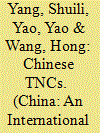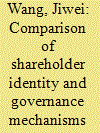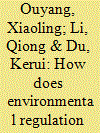|
|
|
Sort Order |
|
|
|
Items / Page
|
|
|
|
|
|
|
| Srl | Item |
| 1 |
ID:
112838


|
|
|
|
|
| Publication |
2012.
|
| Summary/Abstract |
This article is based on data from 32 Chinese transnational corporations in the energy and manufacturing sectors. The results demonstrate a positive correlation, after the reforms, between the proportion of state-owned shares and corporate governance performance in Chinese TNCs. There is found to be no linkage between the proportion of corporate shares and corporate governance performances. The proportion of outstanding shares and corporate governance performance show a positive correlation.
|
|
|
|
|
|
|
|
|
|
|
|
|
|
|
|
| 2 |
ID:
093839


|
|
|
|
|
| Publication |
2010.
|
| Summary/Abstract |
This paper compares the relative effectiveness of two measures by which the Chinese government attempted to improve the monitoring of listed companies: shifting the ownership of state shares from government agencies (GAs) to the corporate form of state-owned enterprises (SOEs), and strengthening corporate governance through statutory regulations and guidelines. The results show that SOEs are better able than GAs to monitor top executives, as indicated by a higher sensitivity of top executive turnover to firm performance. However, corporate governance mechanisms have no significant impact on the sensitivity of top executive turnover to firm performance. This study suggests that incentives for controlling shareholders are more important than governance mechanisms in replacing executives due to poor performance in a transitional economy such as China's, where institutions that support governance mechanisms are still being developed.
|
|
|
|
|
|
|
|
|
|
|
|
|
|
|
|
| 3 |
ID:
122910


|
|
|
|
|
| Publication |
2013.
|
| Summary/Abstract |
Since the Asian financial crisis in 1997, there has been renewed interest in corporate governance policies and practices. This study focuses on corporate governance practices in Malaysia, where the increasing incidence of fraud suggests a lack of adequate corporate governance systems in Malaysian listed companies. Using an unbalanced data set comprising 200 companies representing a total of 579 firm-year observations, this study examines the effects of internal corporate governance mechanisms on the occurrence of fraud. Specifically, it looks at the effects of board characteristics, ownership structure and quality of audit on the occurrence of fraud in Malaysian listed companies from 2007 to 2009. The findings indicate that the number of board meetings was positively associated with the occurrence of fraud, but both state and foreign ownership revealed a negative correlation, whereas factors including the number of independent directors, board size, CEO duality and the quality of audit had no observable effects.
|
|
|
|
|
|
|
|
|
|
|
|
|
|
|
|
| 4 |
ID:
103352


|
|
|
|
|
| Publication |
2011.
|
| Summary/Abstract |
This study focuses, firstly, on the pricing of electricity in the Finnish retail market. In particular, the impact of the ownership structure on prices is tested empirically. Secondly, the influence of low-cost electricity sources on retail prices is considered. The question about whether the average fuel costs rather than the wholesale price determine the retail prices is thus addressed. The supply side behaviour characterised may explain the passivity of client activity in the seemingly competitive Finnish market.
|
|
|
|
|
|
|
|
|
|
|
|
|
|
|
|
| 5 |
ID:
176694


|
|
|
|
|
| Summary/Abstract |
Promoting technological innovations by environmental regulation is one of the essential means to achieve green transformation. This study investigates the effect of environmental regulation on technological innovations based on the provincial panel data of industrial sectors in China during the years 2005–2015. The two-way fixed-effect panel data model is used to investigate the marginal and heterogeneous impacts empirically. Results indicate a U-shaped relationship between environmental regulation and technological innovations. In the short-term, environmental regulation has an “offsetting effect” on the research and innovation capacity of China's industrial sector. However, with the deepening of environmental regulation, it forces the industry to reduce the cost of pollution control by improving technological innovation capacity, thus creating a “compensation effect”. Results also show that environmental regulation policies changed the location and industry selection of foreign capital, which weakened the positive effect of FDI on technological innovations, indicating the “pollution shelter” effect. From the perspective of different types of enterprises, due to the higher cost of energy conservation and emission reduction, environmental regulation is detrimental to the technological innovations of state-owned enterprises. In particular, we find that industries with a higher degree of market competition and higher human capital investment tend to have stronger technological innovation capabilities.
|
|
|
|
|
|
|
|
|
|
|
|
|
|
|
|
| 6 |
ID:
111324


|
|
|
|
|
| Publication |
2012.
|
| Summary/Abstract |
This paper analyzes whether public ownership has an impact on providers' price-setting. Under the assumption of more efficient energy provision which benefits customers a large number of former energy monopolists have been privatized in line with the liberalization of energy markets in Germany at the end of the 1990s. However, current re-municipalizations are justified by similar arguments in the public debate.
Based on a dataset on the ownership structure of energy providers we find that public property or private property itself is not the decisive factor for lower retail and wholesale prices. Rather, a high ownership concentration leads to low prices, regardless of the type of owner. As public investors often seek total ownership of a provider, households, which are less willing to switch, benefit at least indirectly from public ownership. Tests for robustness of our results applying different owner and concentration measures confirm the results independently from the underlying estimation specification.
|
|
|
|
|
|
|
|
|
|
|
|
|
|
|
|
| 7 |
ID:
087426


|
|
|
|
|
| Publication |
2009.
|
| Summary/Abstract |
Joint ventures in China between Japanese and Taiwanese firms have been increasing since the end of the 1980s. However, the literature suggests that the performance of joint ventures with third-country-based firms is the lowest among all types of joint ventures. The reasons attributed are that this type of joint venture lacks local access through a local partner and entails higher organizational costs, stemming from the large cultural distance between investing parties at both the national and corporate levels. Proving otherwise, this article preliminarily shows that the termination rate of Japanese-Taiwanese joint ventures in China is not necessarily high compared with that of overall Japanese investments in China. Joint ventures with Taiwanese companies improve local access for Japanese partners by making it easier to: (1) access Taiwanese affiliates with a large economic presence in China; (2) facilitate smooth entry into the local market by utilizing distribution networks that Taiwanese parties possess there; and (3) gain local information from Taiwanese partners whose language and culture are similar to China's. The article also suggests that organizational costs are reduced because of the mutual trust built as a result of the long history of collaboration between Japanese and Taiwanese partners.
|
|
|
|
|
|
|
|
|
|
|
|
|
|
|
|
| 8 |
ID:
112733


|
|
|
|
|
| Publication |
2012.
|
| Summary/Abstract |
We employ a new classification of ownership identity to analyze the impact of ownership structure on enterprise performance in China. Using both fixed effects model and Generalized Methods of Moments (GMM), this study finds that marketized state-owned enterprises outperform firms controlled by the government, indicating that partial privatization of state-owned Chinese firms improves corporate governance. Non-controlling large shareholders of marketized state-owned enterprises and private enterprises are found to play active roles in corporate governance. Lastly, there is evidence that ownership concentration of a controlling shareholder decreases the incentives to expropriate minority shareholders.
|
|
|
|
|
|
|
|
|
|
|
|
|
|
|
|
| 9 |
ID:
192789


|
|
|
|
|
| Summary/Abstract |
This paper studies the ownership structure among participants in the Swedish tradable green certificate (TGC) system and its implications for TGC prices. First, we investigate cross-ownership – a situation when a firm is active on both the demand and supply sides of the TGC market – by linking suppliers and obliged parties to their parent firms. Next, we calculate indexes of market concentration that account for cross-ownership. Finally, we use detailed TGC transaction-level data to analyze differences in the prices of the TGCs traded by cross-ownership versus non-cross-ownership firms. Our results show considerable cross-ownership, with many firms active on both TGC supply and demand sides. However, even after accounting for cross-ownership, the market concentration of the entire TGC market is low and has decreased over time. Despite the absence of market concentration, our analysis of TGC prices indicates that cross-ownership firms have the ability to differentiate TGC prices from non-cross-ownership firms. Such behavior is consistent with the behavioral assumption that the ultimate owner's objective is to maximize the total profit of the portfolio of shares, and that, therefore, the pricing behavior would differ from that of a perfectly competitive firm without ownership links to other firms in the industry.
|
|
|
|
|
|
|
|
|
|
|
|
|
|
|
|
| 10 |
ID:
105279


|
|
|
|
|
| Publication |
2011.
|
| Summary/Abstract |
This paper considers evidence on business group productivity performance in China. It also carries out a detailed investigation into China's 50 largest groups to see if pyramidal groups are forming. As such, we further explore what can be considered as some of the positive and negative attributes of Chinese groups. We show that although improvements in productivity have taken place, some Chinese business groups are also taking the first steps towards developing pyramidal structures. This could have important implications for longer-term productivity growth in China's business groups.
|
|
|
|
|
|
|
|
|
|
|
|
|
|
|
|
| 11 |
ID:
103904


|
|
|
|
|
| Publication |
2011.
|
| Summary/Abstract |
The promotion tournament as a potentially important incentive mechanism for top management in transition economies has not been examined by the literature on managerial incentives. This paper attempts to fill this important gap in the literature. The paper begins with modifying the empirical predictions previously-derived from the tournament theory to the context of transition economies in which state ownership still plays a significant role in publicly-traded firms. Specifically, we test the following two hypotheses. First, the winner's prize will need to increase in order to prevent each contestant from lowering his/her effort level in the face of a larger contestant pool. Such an optimal response of the winner's prize to the size of the contestant pool is more evident for China's listed firms that are less controlled by the state. Second, the winner's prize will also need to rise in order to prevent each contestant from reducing his/her effort level in the face of greater market volatility (or more noise in the performance measure used to determine the tournament winner). Using comprehensive financial and accounting data on China's listed firms from 1998 to 2002, augmented by unique data on executive compensation and ownership structure, we find evidence in support of both hypotheses. Finally, we also find evidence suggesting that an increase in the winner's prize will result in improved firm performance due to enhanced managerial effort, and that the performance effect of the winner's prize is greater for China's listed firms that are less controlled by the state. As such this paper provides yet another piece of evidence that ownership restructuring may be needed for China to successfully transform its SOEs to efficient modernized corporations and reform its overall economy.
|
|
|
|
|
|
|
|
|
|
|
|
|
|
|
|
| 12 |
ID:
172116


|
|
|
|
|
| Summary/Abstract |
This paper investigates the influence of ownership structure on corporate governance practices of Turkish companies listed in Borsa Istanbul Corporate Governance Index (XKURY). It proposes a context-specific ownership structure (founding families, state ownership, foreign ownership from both developed and emerging markets, and institutional investors), and publicly available corporate governance scores as indicators for corporate governance practices. The results of fixed effects panel regression analyses show that state ownership has a negative influence on weighted and non-weighted average corporate governance scores, as mainly determined by shareholder protection and board of directors-related practices during 2010–2017. The evidence regarding the other ownership categories is not sufficient over alternative estimations. Overall, the study provides a critical assessment of the role of ownership in shaping the corporate governance practices of XKURY companies.
|
|
|
|
|
|
|
|
|
|
|
|
|
|
|
|
|
|
|
|
|